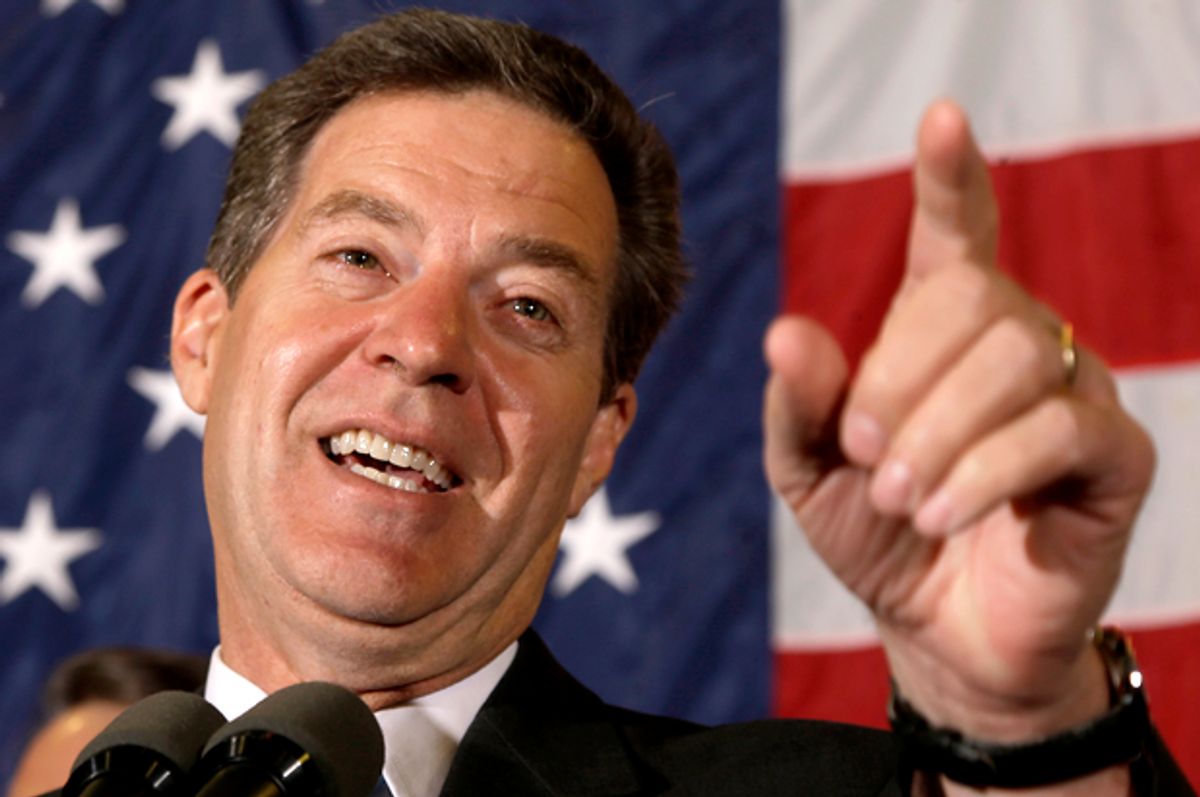When recently asked what was the matter with Kansas, Republican Gov. Sam Brownback ignored the steaming pile of economic wreckage that his supply-side experiment has caused in the state, and suggested that President-elect Donald Trump should take the Kansas model nationwide.
In an interview with the Wall Street Journal published Friday, America's least popular governor urged Trump to mimic the massive spending and tax cuts he implemented in Kansas -- which have led to growing budget gaps, missed growth projections and two credit downgrades for the state.
Critics “won’t look with any depth or detail at the impact on small business growth or private-sector job growth," Brownback said, brushing aside the evidence that his policies have failed disastrously. "That’s the target, that’s what we’re after.”
When Brownback eliminated the state income tax for partnerships, limited liability corporations and other similarly structured entities in 2012 and 2013, he promised it would act “like a shot of adrenaline into the heart of the Kansas economy.” Now Kansas is experiencing such massive revenue shortages crisis that earlier this year Brownback quietly discontinued quarterly reports intended to highlight the state’s rapid economic growth. He has also been forced to raise the state sales tax, one of the most regressive ways of collecting revenue. The devastation of Brownback's Kansas experiment is described by the Journal:
The tax-cut plan was paired with other policy changes, and the top individual income-tax rate dropped to 4.6% from 6.45%. Kansas also reduced growth in state spending to an average of 1.5% a year under Gov. Brownback, compared with 6.6% under his predecessor, due to cuts in higher education, Medicaid and other programs.
To fill budget holes, Mr. Brownback also won legislative approval to take about $2 billion from highway funding, delaying more than 30 transportation projects, according to the state transportation department.
Kansas has lost jobs this year, even as the U.S. as a whole has seen 1.7 percent job growth, according to the Labor Department. Brownback insists, however, that the state has “never had more private-sector jobs.” Confronted with surveys indicating that 70 percent of Kansans think the state is now on the wrong path and 74 percent disapprove of his job performance, Brownback claims that the voters simply don’t understand his policies.
“Change is a difficult thing in the body politic,” he told the Journal, faulting his elimination of teacher tenure as the main culprit for his low approval rating.
Kansas faces a $350 million budget deficit — which is expected to grow in the coming fiscal year — yet Brownback remains undeterred in his quest to scale his failed supply-side economics up to the federal level. According to the Journal, Brownback has succeeded in selling his plan to right-wing economist Stephen Moore, a Trump adviser and supply-side champion. Moore said he used Kansas as a model for Trump’s tax proposal and has learned from Brownback's failure to find a suitable fix:
Nationally, the idea is to measure “reasonable compensation,” the portion of a business’s income attributable to the owner’s labor, which would be taxed as wages — with the rest taxed at the lower pass-through rate.
The so-called pass-through rate refers to the gap between top tax rates on wages and business income. Under Brownback's plan, corporations could often pass through business income to an owner’s individual tax return, allowing them to avoid paying taxes without creating any jobs. Moore insisted to the Journal that Trump's plan would succeed where Brownback failed.
“Sometimes it was legitimate, and sometimes it was a gaming of the tax system to pay the zero rate, so that loophole has to be closed,” Moore said of the pass-through rate. “Unless you have some rules about this, people really will shift income and they’ll find ways to legally avoid paying tax, and that was never the intention.”
Still,there remain few signs that either Trump or Republican lawmakers in Washington have learned the lesson of what's actually the matter with Kansas:
The Republican plans in Washington wouldn’t scrap pass-through taxes, and they have other components designed to boost growth, including lower corporate tax rates and immediate write-offs for capital investment. But both Mr. Trump and the House GOP would open a larger gap between top tax rates on wages and business income than Mr. Brownback did.
Mr. Trump would drop the business income rate to 15%, below his proposed 33% maximum tax rate on wages. Mr. Trump’s advisers left some details fuzzy, and a second layer of tax may apply. House Republicans would tax wages at a maximum of 33% while pass-through income would get a 25% rate, with no tax on later dividends as Mr. Trump envisions.

Shares